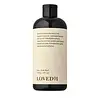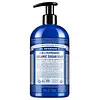What's inside
What's inside
 Key Ingredients
Key Ingredients

 Benefits
Benefits

 Concerns
Concerns

 Ingredients Side-by-side
Ingredients Side-by-side

Water
Skin ConditioningMyristic Acid
CleansingStearic Acid
CleansingPotassium Hydroxide
BufferingCocamidopropyl Betaine
CleansingPalmitic Acid
EmollientLauryl Glucoside
CleansingGlycol Distearate
EmollientCocos Nucifera Oil
MaskingSimmondsia Chinensis Seed Oil
EmollientButyrospermum Parkii Butter
Skin ConditioningSodium Hyaluronate
HumectantCamellia Sinensis Leaf Extract
AntimicrobialRosa Canina Seed Oil
EmollientHippophae Rhamnoides Oil
EmollientLecithin
EmollientTocopheryl Acetate
AntioxidantJuniperus Virginiana Wood Oil
PerfumingAbies Sibirica Oil
MaskingJuniperus Communis Fruit Oil
MaskingPhenoxyethanol
PreservativeEthylhexylglycerin
Skin ConditioningWater, Myristic Acid, Stearic Acid, Potassium Hydroxide, Cocamidopropyl Betaine, Palmitic Acid, Lauryl Glucoside, Glycol Distearate, Cocos Nucifera Oil, Simmondsia Chinensis Seed Oil, Butyrospermum Parkii Butter, Sodium Hyaluronate, Camellia Sinensis Leaf Extract, Rosa Canina Seed Oil, Hippophae Rhamnoides Oil, Lecithin, Tocopheryl Acetate, Juniperus Virginiana Wood Oil, Abies Sibirica Oil, Juniperus Communis Fruit Oil, Phenoxyethanol, Ethylhexylglycerin
Ingredients Explained
These ingredients are found in both products.
Ingredients higher up in an ingredient list are typically present in a larger amount.
Cocos Nucifera Oil is obtained from the kernels of the coconut fruit. In other words, this is coconut oil.
Coconut Oil is rich in fatty acids with lauric acid making up the majority of these. It also contains linoleic acid. Due to this high fatty acid content, coconut oil helps trap moisture and soften skin.
Despite being antibacterial, coconut oil may not be great for acne-prone skin. It is comedogenic and may clog pores. This ingredient may not be safe for malassezia or fungal acne.
Note: Coconut Oil should not replace your sunscreen for UV protection. Studies show it only blocks about 20% of UV.
This oil is non-volatile and has a light scent.
The term 'fragrance' is not regulated in many countries. In many cases, it is up to the brand to define this term. For instance, many brands choose to label themselves as "fragrance-free" because they are not using synthetic fragrances. However, their products may still contain ingredients such as essential oils that are considered a fragrance.
Learn more about Cocos Nucifera OilPotassium hydroxide is commonly known as caustic potash. It is used to fix the pH of a product or as a cleaning agent in soap. In cleansers, it is used for the saponification of oils.
Sapnification is the process of creating fatty acid metal salts from triglycerides and a strong base. During this process, Potassium Hydroxide is used up and is not present in the final product.
Using high concentrations of Potassium Hydroxide have shown to irritate the skin.
Learn more about Potassium HydroxideThis oil comes from the seeds of the desert shrub called Jojoba. It is more commonly known as jojoba oil, a non-comedogenic oil.
Jojoba oil does not contain fragrance and has many fatty-acids, making it a great soothing ingredient.
It also contains Vitamin E, a great moisturizing ingredient. Vitamin E is also an antioxidant and protects your skin against oxidative damage.
This ingredient humectant properties, meaning it helps draw moisture from the air. This helps keep your skin hydrated.
While jojoba has antibacterial properties, it is only able to kill some strains of bacteria.
Studies also show it helps in wound healing. In fact, Indigenous cultures have used jojoba as a moisturizer and to help treat burns for centuries.
Fun fact: Jojoba oil similar to natural human skin sebum, so it has a great effect on dry skin. It is also promising with helping to regulate sebum production.
Due to its fatty acid content, Jojoba oil may not be fungal acne safe. We recommend speaking with a professional if you have any concerns.
Learn more about Simmondsia Chinensis Seed Oil